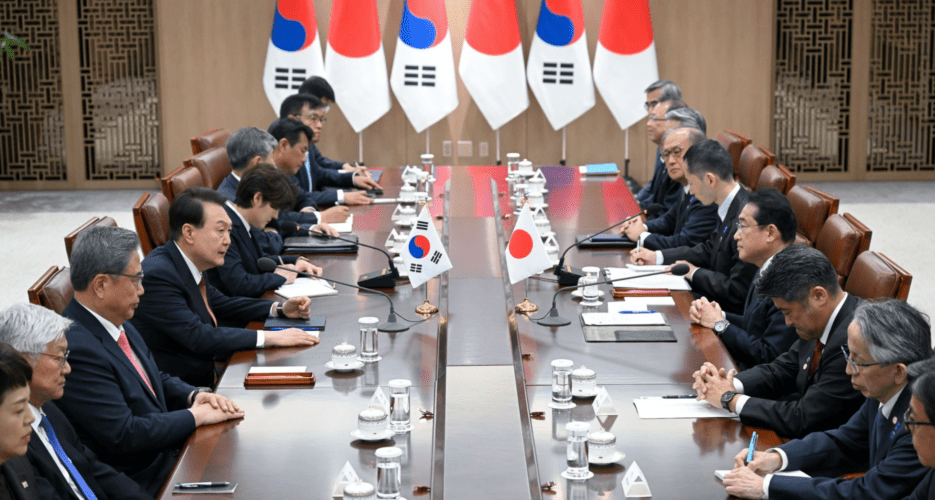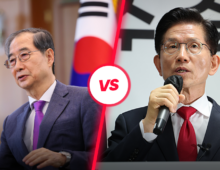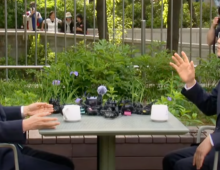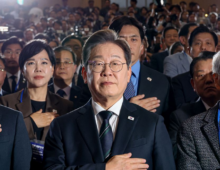Japanese Prime Minister Fumio Kishida visited South Korea for a two-day summit with President Yoon Suk-yeol, marking the full-scale resumption of “shuttle diplomacy” between the countries after 12 years. Kishida’s visit occurred about two months after Yoon visited Tokyo, following Seoul’s decision to compensate Korean victims of Japanese wartime forced labor without contributions from Japanese firms. Upon arrival, Kishida paid his respects at Seoul National Cemetery. During a joint press conference, Kishida expressed remorse for the “horrendous damage and pain” Japan’s colonial rule inflicted on the Korean people, while Yoon reaffirmed Seoul’s stance on the forced labor issue. Additionally, Yoon mentioned that he and Kishida agreed to allow South Korean experts to inspect the planned release of radioactive water from the crippled Fukushima nuclear power plant later this month.
Kishida and Yoon discussed various topics, including security, high-tech industries, science and technology, and cultural cooperation. They acknowledged North Korea’s nuclear and missile development as a global threat and agreed to work closely on South Korea’s Indo-Pacific strategy and Japan’s vision for a free and open Indo-Pacific. Yoon left open the possibility of Japan’s future participation in the Washington Declaration, a pact he adopted with U.S. President Joe Biden to strengthen the U.S. commitment to defending South Korea. Yoon also announced his upcoming visit to Hiroshima to attend the G-7 summit later this month and participate in a trilateral summit with U.S. President Joe Biden during the gathering.
Japanese Prime Minister Fumio Kishida visited South Korea for a two-day summit with President Yoon Suk-yeol, marking the full-scale resumption of “shuttle diplomacy” between the countries after 12 years. Kishida’s visit occurred about two months after Yoon visited Tokyo, following Seoul’s decision to compensate Korean victims of Japanese wartime forced labor without contributions from Japanese firms. Upon arrival, Kishida paid his respects at Seoul National Cemetery. During a joint press conference, Kishida expressed remorse for the “horrendous damage and pain” Japan’s colonial rule inflicted on the Korean people, while Yoon reaffirmed Seoul’s stance on the forced labor issue. Additionally, Yoon mentioned that he and Kishida agreed to allow South Korean experts to inspect the planned release of radioactive water from the crippled Fukushima nuclear power plant later this month.
Kishida and Yoon discussed various topics, including security, high-tech industries, science and technology, and cultural cooperation. They acknowledged North Korea’s nuclear and missile development as a global threat and agreed to work closely on South Korea’s Indo-Pacific strategy and Japan’s vision for a free and open Indo-Pacific. Yoon left open the possibility of Japan’s future participation in the Washington Declaration, a pact he adopted with U.S. President Joe Biden to strengthen the U.S. commitment to defending South Korea. Yoon also announced his upcoming visit to Hiroshima to attend the G-7 summit later this month and participate in a trilateral summit with U.S. President Joe Biden during the gathering.
Get your
KoreaPro
subscription today!
Unlock article access by becoming a KOREA PRO member today!
Unlock your access
to all our features.
Standard Annual plan includes:
-
Receive full archive access, full suite of newsletter products
-
Month in Review via email and the KOREA PRO website
-
Exclusive invites and priority access to member events
-
One year of access to NK News and NK News podcast
There are three plans available:
Lite, Standard and
Premium.
Explore which would be
the best one for you.
Explore membership options
© Korea Risk Group. All rights reserved.
No part of this content may be reproduced, distributed, or used for
commercial purposes without prior written permission from Korea Risk
Group.












